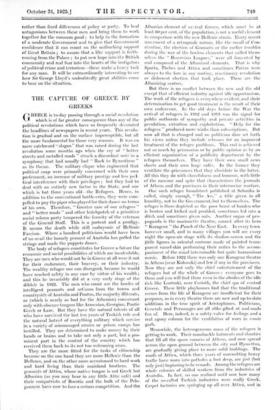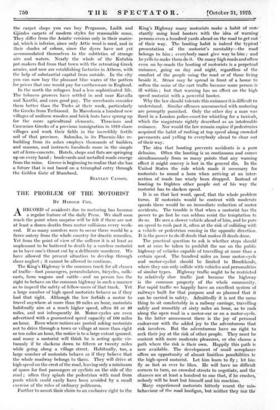THE CAPTURE OF GREECE BY GREEKS
GREECE is to-day passing through a social revolution which is of far greater consequence than any of the political revolutions which have so frequently decorated the headlines of newspapers in recent years. This revolu- tion is gradual and on the surface imperceptible, but all the more fundamental for those very reasons., It was no mere catchword "slogan" that was raised during the last revolution some months ago when the cry of " better streets and metalled roads " struck a discordant note in a symphony that had usually had " Back to Byzantium " as its theme. The military clique who engineered that political coup were primarily concerned with their own preferment, an increase of military prestige and less poi- tical interference with their privileges ; but they had to deal with an entirely new factor in the State, and one which is but three. years old—the Refugees. Hence, in addition to the conventional battle-cries, they were com- pelled to pay the piper who played for their dance on terms of his own. Therefore, " Greater care of our refugees " and " better roads " and other hotchpotch of a primitive social reform party tempered the ferocity of the veterans of the General Staff. This is a portent and a prodigy. It means the death while still embryonic of Hellenic Fascism. Where a hundred politicians would have been of no avail the homely peasant of Anatolia has pulled the strings and made the puppets dance.
The body of refugees constitutes for Greece a future the economic and social possibilities of which are incalculable. They are men who would not be in Greece at all were it not for their endurance, their bravery, or their industry. The wealthy refugee one can disregard, because he would have reached safety in any case by virtue of his wealth ; and this he invariably did at a very early stage of the &beide in 1922. The men who count are the hordes of intelligent peasants and artisans from the towns and countryside of Anatolia and Pontus, the majority illiterate, or (which is nearly as bad for the Athenian) conversant only with obscure tongues like Armenian, Georgian, Pontic Greek or Laze. But they have the natural talents of all who have survived the last ten years of Turkish rule and the natural hatred of everything military which service in a variety of mismanaged armies or prison camps has instilled., They are determined to make money by their hands or brains and to take not only a part, but a pro- minent part in the control of the country which has received them back to its not too welcoming arms.
They, are the more fitted for the tasks' of citizenship because on the one hand they are more Hellenic than the Hellenes, and on the other more accustomed to hard work and .haref living than their. mainland brothers. The peasants of Attica, whose native tongue is not Greek but Albanian (as you may hear in any little Attic café) and their compatriots. of Boeotia and the bulk of the Pelo- ponnese have now to face a serious competition. And the Albanian element of central Greece, which must be at least 60 per cent. of the population, is not a usefUl clement in comparison with the new Hellenic strain. Every recent movement of a retrograde nature, like the recall of Con- stantine, the election of Gounaris or the earlier troubles during the war of the lawless elements that culled them- selves the " Reservists Leagues," were all fomented by and composed of the Albanized elements. That is why Sparta, Thebes and Attica and sometimes Patras were always to the fore in any mutiny, reactionary revolution or dishonest election that took place. These arc the Albanizing centres.
But there is no conflict between the new and the old except that of efficient industry against idle opportunism. The work of the refugees is everywhere evident, and their determination to get good treatment is the result of their own endeavour. In the old days before the War the arrival of refugees in 1912 and 1913 was the signal for public outbursts of sympathy and private activities in peculation, extortion and exploitation. " Help for the refugees " produced more winks than subscriptions. But now all that is changed and no politician dare set forth his views unless they include schemes for an improved treatment of the refugee problems. This end is achieved not so much by persuasion or by public opinion as by an efficient organization of a publicity department by the refugees themselves. They have their own small news sheets and their own large cafés. In the former they ventilate the grievances that they elucidate in the latter. All this they do with cheerfulness and huthour, with little of the rancour and spite that characterizes the journals of Athens and the provinces in their internecine warfare.
One such refugee broadsheet published at Salonika is called, simply enough, " The Ass," a title given: in all humility, not to the Government, but to themselves. The refugee is there depicted as the poor beast of burden who is beaten and kicked and prodded, sometimes led into a ditch and sometimes given oats. Another organ of pro- paganda is the marionette theatre, named after its hero "Karageuz " the Punch of the Near East. In every town however small, and in many villages you will see every night the open-air stage with its shadow-screen and the little figures in oriental costume made of painted trans- parent camel-skin performing their antics to the accom- paniment of the usual interminable but quite harmonious music. Before 1922 there was only one Karageuz theatre in Athens (near Kolonaki) and few if any in the provinces. Now they are not only the chief entertainment of the refugees but of the whole of Greece : everyone goes to them and you will find them even in the abodes of the idle rich like Loutraki, near Corinth, the chief spa of central Greece. These little playhouses find that the traditional scenes from the life of Karageuz are insufficient for their purposes, so in every theatre there arc new 'and up-to-date. additions in the true spirit of Aristophanes. Politicians, Generals and Personages are all alike gibed at and made fun of. Here, indeed, is a safety-valve for feelings and a real agony column for the ventilation of woes in comic garb.
Meanwhile, the heterogeneous mass of the refugees is getting to work. Their ramshackle hutments and shanties that fill all the spare corners of Athens, and now spread across the open ground between the city and Hymettus, are gradually giving place to more solid buildings. The roads of Attica, which three years of unremitting heavy traffic have worn into potholes a foot deep, are just (but . only just) beginning to be remade. Among the 'refugees are whole colonies of skilled workers from the industries of Anatolia. In fact, no one realized until now how many of the so-called TUrkish industries were really Creek., Carpet factories are springing up all over Attica, and in the carpet shops you can buy Pergamon, Ladik and Gjordes carpets of modern styles for reasonable sums. They differ from the Asiatic versions only in their mater- ial, which is inferior, since only Attic wool is used, and in their shades of colour, since the dyers have not yet' accon-u-nodated themselves to the subtleties of strange airs and waters. Nearly the whole of the Kutahia pot-makers fled from that town with the retreating Greek armies, and now are establishing factories in Athens, with the help of substantial capital from outside. In the city you can now buy the pleasant blue wares of the potters for prices that one would pay for earthenware in England. - In the north the refugees lead a less sophisticated life. The tobacco growers have settled in and near Kavalla and Xanthi, and earn good pay. The merchants consider them better than the Turks at their work, particularly the Greeks from Trebizond. In Macedonia a hundred new villages of uniform wooden and brick huts have sprung up for the more agricultural elements. Thracians and Caucasian Greeks of a previous immigration in 1919 share villages and work their fields in the incredibly fertile' soil of that province. Salonika, in its Phoenix-like re- building from its ashes employs thousands of builders and masons, and instructs hundreds more in the simple art of ferro-concrete. Hotels, shops and flats are springing up on every hand ; boulevards and metalled roads emerge from the ruins. Greece is beginning to realize that she has a future that is not based on a triumphal entry through the Golden Gate of Stamboul.
STANLEY CASSON.































































 Previous page
Previous page